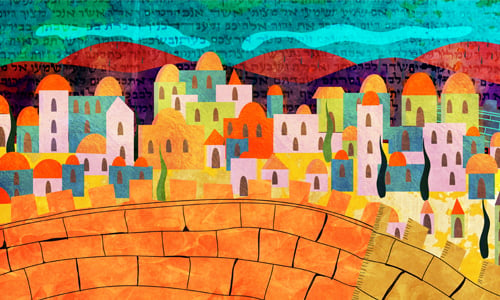Phinehas (also spelled Pinchas or Phineas) of the Bible was a grandson of Aaron and great-nephew of Moses. He is famous for his zealotry in slaying Zimri, the licentious leader of the tribe of Simeon, thus halting a deadly divine-sent plague afflicting the Jewish nation. As a reward, he was granted priesthood. According to Midrashic sources, Phinehas is the same persona as Elijah the Prophet.
The portion in the Book of Numbers known as Pinchas is named after him.
Phinehas’ Lineage
Phinehas was the son of Elazar and grandson of Aaron the High Priest.1 The verse describes Phinehas’ mother as being “from among the daughters of Putiel.”2 The Talmud explains this to mean that she was a descendant of both Joseph, son of Jacob; and Jethro, father-in-law of Moses.3
The Story of Phinehas the Zealot
Phinehas was among the Israelites who left Egypt and survived the long desert journey to the Land of Israel. However, it was only at the end of this 40-year period, when the Jews were just months away from their destination, that he gained his fame.4
The Jews were camped at Shittim, an area in the plains of Moab, at the banks of the Jordan River. At the counsel of the evil prophet Balaam, the daughters of Moab and Midian enticed the Jews to sin with them, subsequently leading them to worship their god, known as Peor.
The Jews’ behavior aroused divine wrath, and they were beset by a plague that would ultimately leave 24,000 Jews (from the tribe of Simeon5) dead. At the instruction of G‑d, Moses summoned the nations’ leaders and told them to judge the offenders and punish them with death, thus causing G‑d’s anger to subside. The nation congregated at the entrance to the Tabernacle, intending to follow Moses’ command.
However, before they were able to do so, Zimri son of Salu, one of the leaders of the tribe of Simeon,6 approached the crowd together with Cozbi daughter of Zur, one of the five Midianite kings. As everyone looked on, he entered a tent and blatantly engaged in intercourse with her.
Seeing this outright rebellious behavior, Phinehas grabbed a spear, entered the tent and pierced them both together, as they were in middle of the act. This deed brought about an immediate end to the plague.
Read more: How to Become a Trailblazer
Phinehas’ act placed him in great danger. The Talmud relates that G‑d performed no less than six miracles on his behalf to protect him from harm.7 Due to Phinehas’ association with miracles, envisioning Phinehas in a dream is said to foretell that a wondrous event will occur to the viewer.8
An Exception
Phinehas’ act was not merely a spontaneous reaction but had legal basis in Jewish law. Although a penalty could normally only be administered by the court, in a few select instances an allowance was given for onlookers to mete out punishment independently. One such scenario was if one witnessed a Jewish man sin with a non-Jewish woman in public.9
This authorization to punish was limited to the actual time of coitus, and not a moment later. Furthermore, if one would approach the court and ask for permission to administer punishment, he would be told to refrain. It was only if he did so on his own accord that it would be considered praiseworthy.10
Read more: How to Take the Law Into Your Own Hands

Defining Zealotry
The nature of Zimri’s crime made his killing an extremely sensitive moral issue. On the one hand, the Torah deems what he did deserving of death. On the other hand, it does not entrust the carrying out of the sentence to the normal judiciary process, ruling instead that “zealots should smite him.” Who, then, qualifies as a zealot?
The motives of the zealot who takes unilateral action are extremely important, for his very qualifications as a zealot hinge upon the question of what exactly prompted him to do what he did. Is his act truly an act of peace, motivated to “still G‑d’s wrath,” or has he found a holy outlet for his individual aggression, made kosher by the assumption of the label “zealot”?
The true zealot is an utterly selfless individual—one who is concerned only about the relationship between G‑d and His people, with no thought for his own feelings on the matter. The moment his personal prejudices and inclinations are involved, he ceases to be a zealot.
The tribes of Israel knew that the case of Zimri warranted the law that “zealots smite him.” But they were skeptical of Phinehas’ motivations. Was Phinehas truly caring and selfless? Far more likely, said they, that what we have here is an angry young man who thinks he found a Torah-sanctioned outlet for his aggression.
So G‑d explicitly attached Phinehas’ name to Aaron (“Phinehas son of Elazar son of Aaron the priest”), the gentlest and most peace-loving man that Israel knew. In character and temperament, G‑d was attesting, Phinehas takes after his grandfather Aaron. Not only is he not inclined to violence—it is the very antithesis of his natural temperament. Phinehas is a man of peace, who did what he did with the sole aim of “turning away My wrath from the children of Israel.”11
Read more: The Zealot
Phinehas Receives Priesthood
G‑d rewarded Phinehas for his bravery with eternal priesthood:
Phinehas son of Elazar son of Aaron the priest has turned My anger away from the children of Israel, by avenging My zeal among them, and I did not destroy the children of Israel due to My zeal. Therefore say: I hereby give him My covenant of peace. It shall be for him and for his descendants after him as an eternal covenant of priesthood, because he was zealous for his G‑d and atoned for the children of Israel.12
The priesthood is generally an inherited status, received by virtue of being born into a priestly family. Why was it necessary for Phinehas to be blessed with priesthood, if his father and grandfather were priests?
The commentators explain that when Aaron was given the gift of priesthood, he was told that he and his sons would be priests, as well as all future male descendants. Phinehas was the only grandchild born beforehand, and thus was not a priest before this point.13

Phinehas in the Land of Israel
Phinehas played a role in a number of later events in Jewish history as well.
Shortly after the Zimri episode, Phinehas joined the 12,000 soldiers sent to wage war against Midian.14
Phinehas was one of the two spies sent by Joshua to scout Jericho. When the king of Jericho heard of their whereabouts and their hostess Rahab offered to hide them, Phinehas declined, saying he had the angelic ability to make himself unseen.15
Read more: Shelach Haftorah in a Nutshell
After conquering the land of Israel, the tribes of Reuben and Gad and half of Manasseh settled to the east of the Jordan river. They then proceeded to build a large altar on the western riverbank. Thinking they had built it for sacrificial purposes, the other tribes prepared to wage war against them, as it was forbidden to sacrifice outside the confines of the Tabernacle in Shiloh. Phinehas led a delegation to the three tribes and pointed out their supposed misdeed. The tribes explained that they had merely built the altar as a testimonial structure, and a possible calamity was averted.16
Phinehas was a prophet,17 and two of his prophecies are mentioned in Scripture.18 Some identify Phinehas as the “G‑dly angel” who appeared to the judge Gideon, delivering G‑d’s message that he would save the Jews from the hands of the Midianites.19
Read more: Gideon
During the incident of the “Concubine at Givah”20 (Listen: Judges: A Time of Division), Phinehas asked for divine instruction whether the Israelites should wage war against the tribe of Benjamin, as punishment for the evil deeds of the inhabitants of Givah.21
The last time Phinehas is mentioned explicitly in Scripture is as a Levite leader during the reign of King David.22 However, according to a famous but enigmatic Midrashic passage, Phinehas was active far later in history as well (see below).

Family and Disciples
Phinehas served as High Priest after the death of his father Elazar, and was succeeded by many generations of High Priests. A list of his descendants who served in this position is given in the Book of Chronicles.23 Most famous among them is Ezra the scribe, Jewish leader at the beginning of the Second Temple period.24
Read more: Ezra the Scribe
Phinehas is mentioned as inheriting a portion of land in Israel, which served as the burial spot for his father Elazar.25
Phinehas received the Oral Tradition from Moses, and transmitted it to the High Priest Eli.26
Read more: Eli the High Priest
Phinehas and Elijah
A number of Midrashic sources identify Phinehas with the famous prophet and miracle worker Elijah (read more: Elijah the Prophet).27 This is based on a number of parallels shared by both personalities, including their long lives and the fact that Scripture compares them both to an angel.28
(Even without being linked to Elijah, who lived over 500 years after Phinehas’ birth, Phinehas enjoyed extreme longevity. He is first mentioned in Scripture during the time of the Exodus from Egypt, in 2448 from Creation [1313 BCE], and was still alive during the reign of King David, who ruled from 2884 until 2924 [877-837 BCE], totaling over 400 years.29)
However, other Midrashic texts state that Elijah was from the tribe of Gad or Benjamin. According to this he was not Phinehas, who was a Levite.30 An alternative approach adopted in kabbalistic works is that Phinehas and Elijah shared souls.31
The similarity between Phinehas and Elijah is also expressed in their behavior. On the one hand, they were both able to act firmly when necessary, to put right that which is wrong, or to protect from danger. On the other hand, they both saw the goodness in others, his or her potential and their positive achievements. (Read more: The Road to Peace.)











Join the Discussion